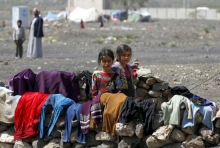ILO Tripartite Technical Meeting on Access of Refugees to the Labour Market

The ILO Tripartite Technical Meeting will bring together 8 Government representatives (Australia, Brazil, Ethiopia, Germany, Jordan, Kenya, Turkey and USA), 8 Workers and 8 Employers to comprise the Experts who will discuss, deliberate and adopt the Guiding Principles on the Access of Refugees and Forcibly Displaced Persons to the Labour Market. These guiding principles will then be submitted for adoption by the ILO Governing Body in November 2016.
It is said that access to decent work is the bridge between moving from humanitarian response to achieving development. This is an area where the ILO provides the niche. It is therefore critical that the ILO, with its tripartite constituents, is able to arrive with strong and authoritative guidelines. These guidelines must be based on the normative framework enshrined in the ILO and UN Conventions.
For PSI, it is important to see this normative framework reflected in the Guidelines. But along with this, we would like to see that the Guidelines are not limited only to access to decent work, but also the access of refugees and forcibly displaced persons to quality public services, such as health, education, shelter, utilities and social services, as well as their inclusion in social protection, which are necessary in building their self-reliance, well-being, empowerment and integration in society.
More information:
- PSI Speech delivered at ILO Tripartite Technical Meeting on refugees on 5 July (PSI website)
- Tripartite Technical Meeting on the Access of Refugees and other Forcibly Displaced Persons to the Labour Market (ILO website)
- Background paper and draft ILO guiding principles for discussion at the meeting (ILO website)
- UNHCR and ILO sign new agreement to help displaced people find work (ILO website)

